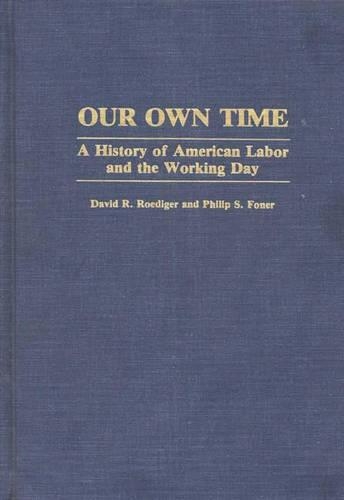
Our Own Time: A History of American Labor and the Working Day
(Hardback)
Publishing Details
Our Own Time: A History of American Labor and the Working Day
By (Author) David R. Roediger
By (author) Philip S. Foner
Bloomsbury Publishing PLC
Praeger Publishers Inc
27th March 1989
United States
Classifications
Tertiary Education
Non Fiction
331.2570973
Physical Properties
Hardback
392
Description
Our Own Time provides the first full account of the movement to shorten the working day in the United States. Combining the narrative and trade union emphasis of traditional labor history with the focus on culture and the labor process characteristic of contemporary labor history, the book offers an illuminating reinterpretation of the history of the U.S. labor movement from the colonial period onward. The authors argue that the length of the working day or week historically has been the central issue raised by the American labor movement during its most vigorous periods of organization. Beginning with a picture of working hours in colonial America and the early republic, Roediger and Foner then analyze the ideology of the movement for a ten-hour workday in the early nineteenth century. They demonstrate that the ten-hour issue was a key to the dynamism of the Jacksonian labor movement as well as to the unity of male artisans and female factory workers in the 1840s. The authors proceed to examine the subsequent demands for an eight-hour day, which helped to produce the mass labor struggles of the late nineteenth century and established the American Federation of Labor as the dominant force in American trade unionism. Chapters on labor movement defeats following World War I, on the depression years, and on the lack of progress over the last half-century complete the study. Our Own Time will be an ideal supplemental text for courses in U.S. labor and economic history.
Reviews
. . . this cohesive and well-documented study shows, organized labor won the 40-hour week after intense and deliberate battle with the nation's business class, as well as with the national and local governments. The struggle was often conducted by Eastern Eurpoean immigrants and Socialist and Communist union members, who advocated more leisure time to allow workers to educate themselves in citizenship, civic culture, literacy and other skills.-The New York Times
It is obvious that the struggle for shorter hours must become an essential element in the workers' present-day battle against exploitation. Although the progress of this battle cannot be adequately dealt with in the limited space of this review, it is necessary to point up the value of Our Own Time as a resource for today's working class, especially for trade union activists. We have much to learn from our history.-People's Daily World
"It is obvious that the struggle for shorter hours must become an essential element in the workers' present-day battle against exploitation. Although the progress of this battle cannot be adequately dealt with in the limited space of this review, it is necessary to point up the value of Our Own Time as a resource for today's working class, especially for trade union activists. We have much to learn from our history."-People's Daily World
." . . this cohesive and well-documented study shows, organized labor won the 40-hour week after intense and deliberate battle with the nation's business class, as well as with the national and local governments. The struggle was often conducted by Eastern Eurpoean immigrants and Socialist and Communist union members, who advocated more leisure time to allow workers to educate themselves in citizenship, civic culture, literacy and other skills."-The New York Times
Author Bio
DAVID R. ROEDIGER teaches labor history at the University of Missouri. He is the coeditor with Franklin Rosemont, of Haymarket Scrapbook and the author of recent articles in History Workshop Journal, Labor History, Journal of Social History, and Labour/Le Travail. PHILIP S. FONER is Professor Emeritus of History at Lincoln University, Pennsylvania. His numerous books include Organized Labor and the Black Worker, 1619-1973 and the two-volume Women and the American Labor Movement.
